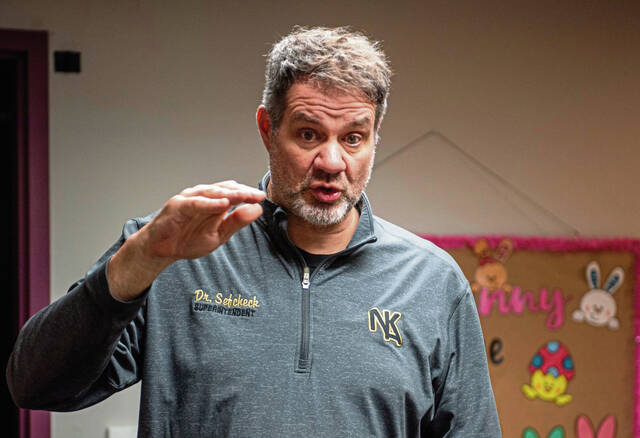New Kensington-Arnold Superintendent Chris Sefcheck compares academic growth at Roy A. Hunt Elementary to that of a physics equation.
“It’s all about momentum,” Sefcheck said. “We have every little piece, and it’s starting to fly.”
Hunt, which serves third through sixth grade students in the New Kensington-Arnold School District, was recently removed from the state Department of Education’s improvement list for the first time in at least a decade.
“You really feel something going on here,” said Jeff Thimons, interim principal at Hunt. “You can feel, in this building, something positive going on.”
The federal Every Student Succeeds Act uses a three-tiered approach to identify schools in need of support.
A Targeted Support and Improvement (TSI) designation, the lowest tier, identifies schools where one or more student groups consistently perform below academic thresholds. It analyzes performance on state assessments and considers factors such as attendance and career readiness benchmarks.
According to the state Department of Education, TSI schools serve as an early warning system for at-risk student groups. Failure to improve from that level requires more intensive support and improvement strategies from the state.
Last year, for example, Hunt received the designation due to low scores by students with disabilities, said Dana Fularz, federal programs liaison and response to instruction and intervention specialist for the district.
Circumstances at Hunt are unique compared to surrounding districts: 71% of students are economically disadvantaged, and 30% are special education students, according to the state. Only 1.5% of students are gifted.
Every Pennsylvania student in third through eighth grade is assessed in English language arts and math. According to state data, 30% of Hunt students tested were proficient or advanced in English language arts, up 3% from the prior year.
Although the state average is 54%, all student groups at Hunt showed improvement from the prior year.
Hunt’s math scores increased 2% from the 2022-23 school year, from 21% to 23%, and the majority of student subgroups showed growth, but were still less than the statewide average of 40%.
However, Hunt students exceeded the statewide average by 4% in English language arts — having a 79% growth score — when it comes to academic growth expectations, according to the state. They did even better in that metric for math scores, having a 94% academic growth score last year compared to the statewide average of 75%.
Gaps between Hunt students and the statewide averages are narrow when it comes to science scores, which the state tests for students in fifth through eighth grades. Fifty-eight percent of Hunt students scored proficient or advanced in science, 1% less than the statewide average; and all student subgroups improved on their scores from the prior year.
Fularz, Thimons and Hunt counselor Stephanie Gardlock have led the interventions to improve academics at Hunt. Those interventions include a Smart Futures online program for age-appropriate career education and an online benchmark assessment called Firefly testing to prep students for Pennsylvania System for School Aassessment (PSSA) testing.
“We want them to see it’s important, and we have the confidence in them,” Fularz said.
Because state statistics rely heavily on testing, Hunt staff tries to refocus students’ mindset when it comes time to take the annual PSSAs, which this year begin April 21.
Sefcheck noted that four Hunt teachers — Greg Kissel, Brad Farineau, Dana Harclerode and Holly Wikander — are in the top 15% statewide of students’ academic growth on state testing.
“We try to keep the expectations high and be positive,” Kissel said. “The kids know what we expect.”
Wikander believes building strong rapport with students leads to better engagement academically.
“It’s a long process, but I think we see growth in that way,” she said.
In addition, the district has a relatively new partnership with Pittsburgh Area Community Schools to bring an attendance specialist to school twice a week, able to conduct home visits and identify students at the risk of becoming truant, Gardlock said.
The school also started an after-school tutoring program this year and implemented a WIN — What I Need — period where math and reading specialists can meet with students for additional support daily.
“We have seen a lot of progress with that,” Fularz said. “We’re really looking forward to what’s ahead.”
Under the leadership of Sefcheck, teachers have a new direction to accomplish student achievement, Thimons said.
Sefcheck credits the school’s growth to its staff.
“We want to be high-achieving,” Sefcheck said. “Designations are nice to get, but the bottom line is: we want to know our kids are ready for life.”















